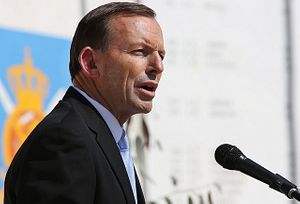The Australian government has announced new counterterrorism measures that will make it easier to detain suspects without a warrant for extended periods and includes mandatory telecommunications metadata collection.
The widespread changes announced earlier this week have raised concerns for human rights, as well as the fears from the Muslim community who feel they are being directly targeted.
Among the changes is a broadening of the definition of a “terrorist organization” to include organizations that promote or encourage terrorism, extended questioning and detention powers without a warrant, and a A$630 million ($585 million) increase in funding for national security agencies over the next four years.
On Thursday, the Lebanese Muslim Association said the new powers seemed to “target the Muslim community” and “give authorities unprecedented and intrusive powers.”
“I urge the government to abandon these divisive measures and restore public confidence in our ostensible rights as citizens in a democratic nation,” the association’s President Samier Dandan said.
While acknowledging the need for safety and security, he added, “Divisive rhetoric and fear-mongering often used by political representatives and the media is only feeding the frenzy of an us-versus-them mentality.”
The Australian National Imams Council have said that “the proposed changes to the anti-terrorism laws will severely impinge on the rights and freedoms of all Australians and especially those of Muslim faith.”
The new counterterrorism measures have come in the context of growing government and public concern about Australians returning from fighting in Iraq and Syria to carry out terrorist attacks in Australia. It is believed around 150 Australians are involved in the fighting in the region.
The new changes also include greater intelligence sharing internationally and increased power to cancel passports of Australian nationals.
However, it is the mandatory collection of the meta-data of all citizens that has raised concerns outside of the Muslim community. Under the changes telecommunications companies would be required to store the data, which the Australian Security Intelligence Organisation (ASIO) would be able to access.
Data on users accessing “suspicious” websites could be accessed by ASIO without a warrant, whereas other access to the data would require a “generic warrant.”
After some confusion about what data would be collected, including a bumbling interview with the Attorney General who failed to explain what constituted “meta-data,” the government has clarified that only the IP addresses of users would be kept. Specific activity on websites such as Facebook will not be collected, although ASIO declined to say if conversations from sites such as WhatsApp and Skype could be accessed.
ASIO have sought to play down the intrusive level of the data storage, however many remain skeptical of meta-data intelligence gathering in the wake of the Edward Snowden revelations last year.
The government has said that the widespread nature of potential home-grown terrorist threats justifies the new data collection. However, last month The Saturday Paper reported that members of a parliamentary committee on intelligence and security said that the new ASIO powers were requested almost a year ago and that the current threat of fighters returning from abroad was being used as excuse.
When announcing the measures Prime Minister Tony Abbott said that the threat hadn’t increased but that it was “as high as it has ever been.” He added that while Australia’s terrorism alert level has remained on “medium” since September 11, there was now “heightened concern.”

































